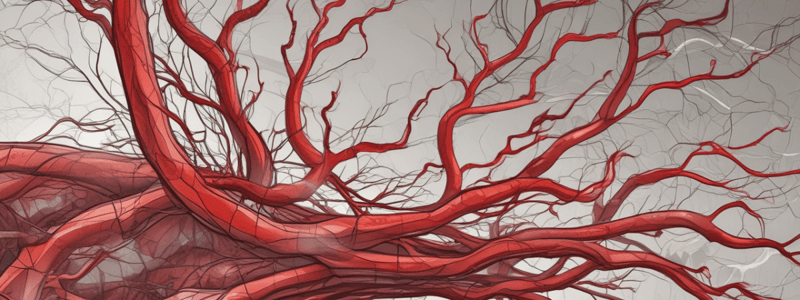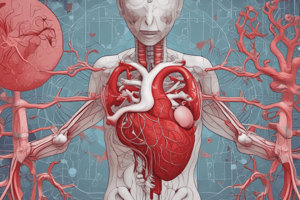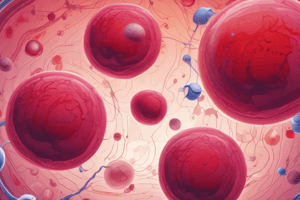Podcast
Questions and Answers
What is the function of the inner elastic membrane in large arteries?
What is the function of the inner elastic membrane in large arteries?
- To increase blood flow to the surrounding tissues
- To mark the outer boundary of the tunica externa
- To provide a supporting structure for the smooth muscle cells
- To mark the outer boundary of the tunica interna (correct)
What type of blood vessels are characterized by high density of elastic fibers in the tunica media?
What type of blood vessels are characterized by high density of elastic fibers in the tunica media?
- Arterioles
- Medium muscular arteries
- Venules
- Large elastic conducting arteries (correct)
Which type of vessels are responsible for controlling blood flow between capillaries and arteries?
Which type of vessels are responsible for controlling blood flow between capillaries and arteries?
- Capillaries
- Medium veins
- Venules
- Arterioles (correct)
Which of the following is NOT a characteristic of arterioles?
Which of the following is NOT a characteristic of arterioles?
What is the primary function of capillaries?
What is the primary function of capillaries?
What is the function of the vasa vasorum in thick-walled vessels?
What is the function of the vasa vasorum in thick-walled vessels?
What is the characteristic of fenestrated capillaries?
What is the characteristic of fenestrated capillaries?
What is the main function of the tunica externa?
What is the main function of the tunica externa?
What percentage of total blood volume is stored in capacitance vessels?
What percentage of total blood volume is stored in capacitance vessels?
Which of the following is a characteristic of arteries in cross-section?
Which of the following is a characteristic of arteries in cross-section?
What is the function of the endothelial lining in constricted arteries?
What is the function of the endothelial lining in constricted arteries?
What is the characteristic of venules?
What is the characteristic of venules?
What is the function of valves in the venous system?
What is the function of valves in the venous system?
What is the function of the smooth muscle cells in the tunica media?
What is the function of the smooth muscle cells in the tunica media?
What is the characteristic of large veins?
What is the characteristic of large veins?
Which type of capillaries have huge gaps between the endothelial cells to allow movement of cells?
Which type of capillaries have huge gaps between the endothelial cells to allow movement of cells?
Flashcards are hidden until you start studying
Study Notes
Types of Blood Vessels
- Aorta branches out to form arteries
- Arterioles are resistance vessels, where blood flow can be controlled by changing diameter
- Venules collect waste, and veins and venules are capacitance vessels, holding most of the blood
Histological Organisation of Blood Vessels
-
Tunica interna (intima):
- Innermost lining of the blood vessel
- Lined by endothelium
- In large arteries, the internal elastic membrane marks the outer boundary
- IEL - inner elastic lamina (arteries) - appears as a wavy pattern on a micrograph
-
Tunica media:
- Middle layer, thick in arteries
- Smooth muscle cells (SMC) supported by varying amounts of connective tissue
- SMC contraction controlled by ANS (Nervi vasorum - nerves), hormones, local chemicals
- Arteries have external elastic membrane
-
Tunica externa (adventitia):
- Outermost layer
- Blends into surrounding tissue and stabilises blood vessels
- In thick walled vessels: blood supply -> vasa vasorum
Distinguishing Arteries and Veins
- Arteries have thicker walls than veins
- Arteries appear rounder in cross sections
- Endothelial lining of constricted arteries is thrown into folds and is pleated (due to IEL)
The Arterial System
-
Large elastic conducting arteries:
- Largest, closest to the heart
- Aorta, pulmonary arteries
- Tunica media contains high density of elastic fibres
-
Medium muscular (distributing) arteries:
- Distribute blood to skeletal muscles and internal organs
-
Arterioles:
- Part of micro circulation
- Tunica externa absent or very thin
- Tunica media: SMC
- Control blood flow between capillaries and arteries
- Site of largest drop in blood pressure
Capillaries
- One layer of endothelium and its basement membrane
- Diameter of one RBC
- For nutrient and gaseous exchange
- Three types based on the size of the gaps between the endothelial cells:
- Continuous - majority of capillaries
- Fenestrated - for filtering in kidneys etc
- Sinusoid - huge gaps between endothelium to allow movement of cells (bone marrow etc)
The Venous System
- Collect blood from tissues, returning it to the heart
- Pressure much less than the arteries
- Walls are thinner and less elastic
- Capacitance vessels (70% of total blood volume)
- Valves: infolding of tunica intima only present in veins and not Venules
Venules
- Collect blood from capillaries
- Resemble capillaries
- Endothelium, thin middle layer with few muscle cells and elastic fibres
- No smooth muscles present
- Very thin tunica externa made of connective tissue fibres
- Primary sites of emigration of white blood cells to enter the tissue fluid
Veins
-
Medium veins:
- Have all three layers
- Thin tunica media with few SMC
- Thick tunica externa
-
Large veins:
- Have diameters greater than 10mm
- Have all three layers
- Thicker tunica externa
- Include superior vena cava and inferior vena cava
Studying That Suits You
Use AI to generate personalized quizzes and flashcards to suit your learning preferences.



